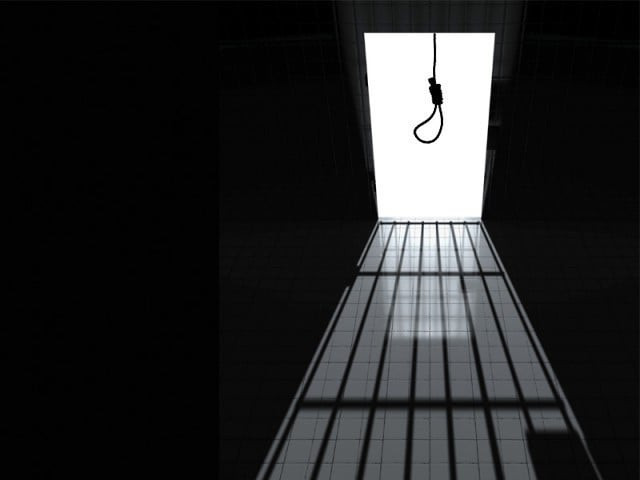Pakistan faults UN for 'misreading' its vote on death penalty resolution
FO spokesperson says Islamabad voted against UNGA resolution seeking abolition of capital punishment

At the UN General Assembly Plenary Session held in New York on Monday, 121 of 193 UN member states, including Pakistan, voted in favour of the seventh resolution calling for a moratorium on capital punishment among signatory countries, according to Amnesty International.
Of the remaining countries, 35 voted against the resolution while 32 abstained. Foreign Office spokesperson Dr Mohammad Faisal, however, claimed that Pakistan's vote was 'mistakenly' read by the United Nations.
"Pakistan voted against the resolution," he told The Express Tribune. "The vote will be corrected as soon as office hours begin in New York," he added.
Faisal later took to Twitter to elaborate it further.
Pakistan, in accordance with its consistent policy, voted against the General Assembly resolution calling for a moratorium on execution, with a view to abolishing the death penalty.(1/2)
— Ministry of Foreign Affairs - Pakistan (@ForeignOfficePk) December 18, 2018
The vote was inaccurately recorded due to technical issues. The Permanent Mission of Pakistan has taken up this matter with the UN Secretariat to put the record straight (2/2).
— Ministry of Foreign Affairs - Pakistan (@ForeignOfficePk) December 18, 2018
The UN General Assembly adopted by consensus the resolution moved by Pakistan on the universal right of people to self determination The Third Committee had earlier recommended this to the GA.
— Dr Mohammad Faisal (@DrMFaisal) December 18, 2018
The Pakistan Peoples Party government had imposed a moratorium on the capital punishment after coming to power in 2008. The moratorium was, however, lifted by the Nawaz Sharif-led government through an executive order after the 2014 terrorist attack on the Army Public School in Peshawar.
The decision was endorsed by parliament through 21st Constitutional Amendment in January 2015 which sought to establish military courts for speedy trials in terrorist offences and acts threatening the security of Pakistan. The move was part of the National Action Plan, a comprehensive strategy to deal with the menace of terrorism.
Since then, Pakistan has executed almost 500 prisoners. The number accounted for 13 per cent of the total executions carried out globally between 2015 and 2017.
According to a report of the Justice Project Pakistan, counting the condemned, Pakistan has sentenced 4,500 people to death and executed around 821 over the last 14 years. The Supreme Court has overturned 85 per cent of the death sentences during appeals in the last three years.
According to a military tally, the federal government had referred 717 accused to military courts. Of which, 546 had been decided. A total of 310 terrorists were awarded the death penalty while 234 were awarded rigorous imprisonment of varied durations ranging from life imprisonment to five years in jail and two others were acquitted.
The military says that 56 condemned prisoners have been executed after final decisions from the top judiciary and rejection of clemency appeals by the president and the army chief.
The Human Rights Commission of Pakistan opposes the death penalty. "We have always said that if this helped curb crime, then crime rates would have fallen. This proves that the capital punishment does not impact the crime rate. Hence no one has the right to award the death sentence," an HRCP spokesperson told The Express Tribune.
"There was a moratorium during the PPP tenure, it was reinstated after 2014. Those who support say that the death penalty is important in terrorism cases – their argument is also strong."
At the UN General Assembly Plenary Session, Malaysia, Dominica and Libya changed their vote in favour of the resolution, while Antigua, Barbuda, Guyana and South Sudan moved from opposition to abstention.
Bahrain and Zimbabwe switched from abstention to opposition and Congo and Guinea moved from in favour to abstention. A total of 35 UN members opposed the move against the death penalty while 32 abstained.
"In 2017 executions were reported in 22 UN member states – 11 per cent of the total," said Amnesty International.
"The fact that more countries than ever before have voted to end executions shows that global abolition of the death penalty is becoming an inevitable reality. A death penalty-free world is closer than ever," said Amnesty International's Death Penalty Expert Chiara Sangiorgio in a press statement.
"This vote sends yet another important signal that more and more countries are willing to take steps to end this cruel, inhuman and degrading punishment once and for all," he added.
"The result also shows the increasing isolation of the 35 countries that voted against the resolution. Those countries still retaining the death penalty should immediately establish a moratorium on executions as a first step towards full abolition."
Crimes punishable by death in Pakistan
Article 10 (a) of the Constitution of Pakistan grants every citizen the right to a fair trial, Article 185 (2) (a) allows the court to award capital punishment to an individual found guilty of any crimes punishable by death as defined in the Pakistan Penal Code (PPC).
The 27 offences punishable by death in the PPC include blasphemy (295-C of PPC); high treason (Section 2 of the High Treason Act, 1973); murder (Section 301 of PPC); hijacking (Section 402-B, C of PPC); waging or abetting war against Pakistan (Section 121 of PPC); Rape (Section 6 of the Zina Ordinance, 1979); adultery (Section 5 of the Offence of Zina Ordinance, 1979); mutiny and subordination (Section 31 of the Pakistan Army Act, 1952); abetment of mutiny (Section 132 of PPC); offences in relation to enemy, treachery, mutiny, and cowardice (Section 24 of the Pakistan Army Act, 1952), arms trading (Section 13-A(1) of the Pakistan Arms (Amendment) Ordinance, 1996), giving up military passwords, intentionally using unassigned military passwords (Section 26 of the Pakistan Army Act); stripping a woman's clothes (Section 354-A of PPC), abduction to subject someone to unnatural lust (Section 12 of the Offence of Zina Ordinance, 1979); kidnapping or abduction of minor (Section 364-A of PPC); kidnapping for ransom or extortion (Section 365-A of PPC); importing, exporting into and from Pakistan dangerous drugs (Section 13 of the Dangerous Drugs Act, 1930); importing, exporting inter-provincially or manufacturing drugs (Section 14 of the Dangerous Drugs Act, 1930); drugs smuggling (Section 9 of the Control of Narcotics Substances Act, 1997); gang rape (Section 10(4) of the Offence of Zina Ordinance, 1979); sabotage of the railways system (Section 127 of the Railways (Amended) Act, 1995); Haraabah (Section 15 of the Offences Against Property Ordinance, 1979); scheduled offence likely to create terror or disrupt sectarian harmony (Section 7 of the Anti-Terrorism Act, 1997); aggravated murder (Section 302 of PPC); robbery resulting in death (Section 396 of PPC) and Bearing false witness intending or knowing the accused may be convicted of a capital offence, if an innocent person is convicted and executed as a result (Section 194 of PPC).



















COMMENTS
Comments are moderated and generally will be posted if they are on-topic and not abusive.
For more information, please see our Comments FAQ